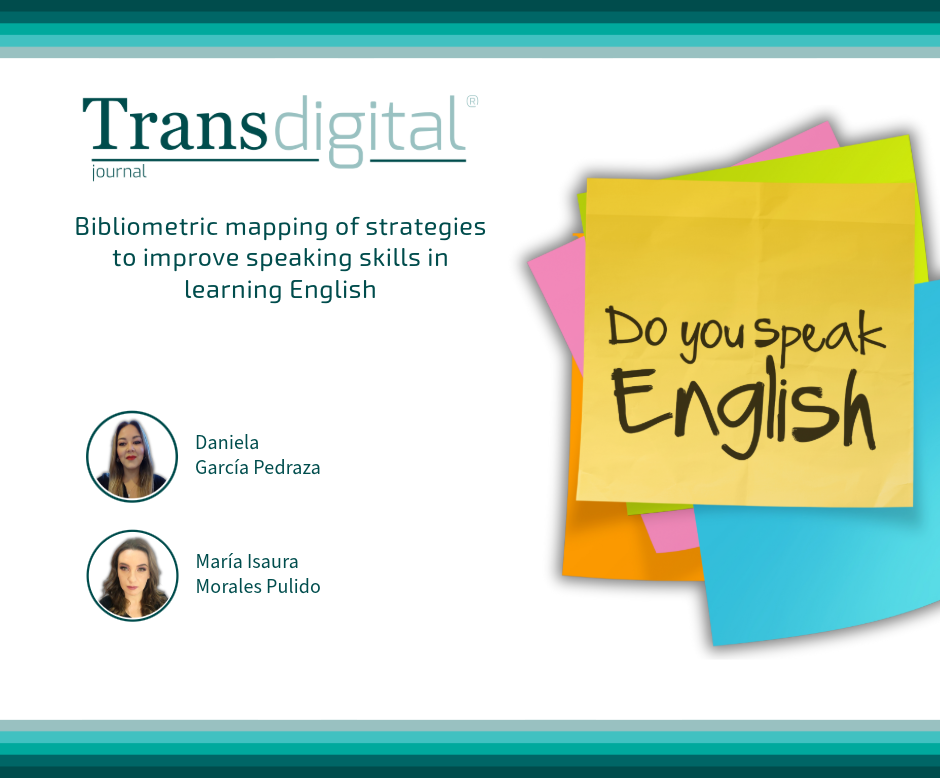Bibliometric mapping of strategies to improve speaking skills in learning English
DOI:
https://doi.org/10.56162/transdigital371Keywords:
language, speaking, learning, skill, strategy, teacher, studentAbstract
Learning the English language is a fundamental skill in education and career development. The speaking skill is the most challenging and critical of all the skills that are developed when learning a new language. Taking this into account, the impact of pedagogical and technological strategies on the development of speaking in English learning was analyzed. For this, the benefits and challenges faced by teaching this skill in the classroom were addressed. A systematic review was carried out with a descriptive approach to analyze scientific research published in the last five years. For this, scientific databases such as Dialnet, Scielo, Semantics Scholar, Scopus and Google Scholar were reviewed. Likewise, the process was carried out in three phases: identification of keywords, selection of recent publications and a critical reflection of the authors' findings. The variables analyzed were language, English, speaking, learning, students, skills, the role of the teacher, and information and communication technologies. The analysis revealed various correlations between the key variables in the context of English learning.
References
Bax, S. (2011). Normalisation Revisited: The Effective Use of Technology in Language Education. International Journal of Computer-Assisted Language Learning and Teaching, 1(2), 1-15. http://dx.doi.org/10.4018/ijcallt.2011040101
Blake, R. (2016). Technology and the four skills. Language Learning & Technology, 20(2), 129–142. http://dx.doi.org/10125/44465
Bronfenbrenner, U. (1979). The Ecology of Human Development Experiments by Nature and Design. Harvard University Press.
Crompton, H. (2013). The benefits and challenges of mobile learning. Learning and Leading with Technology, 41, 38-39.
Darling-Hammond, L., Hyler, M. E., & Gardner, M. (2017). Effective Teacher Professional Development. Learning Policy Institute. https://learningpolicyinstitute.org/sites/default/files/product-files/Effective_Teacher_Professional_Development_REPORT.pdf
Gao, X. (2016). Research in language teaching and language pedagogy. Australian Review of Applied Linguistics, 39(1), 95-98. http://dx.doi.org/10.1075/aral.39.1.05gao
Goh, C., & Burns, A. (2012). Teaching Speaking: A Holistic Approach. Cambridge University Press.
Grant, M. J., & Booth, A. (2009). A typology of reviews: an analysis of 14 review types and associated methodologies. Healt Information and Libraries Journal, 26(2), 91-108. http://dx.doi.org/10.1111/j.1471-1842.2009.00848.x
Hongsa, N., Wathawatthana, P., & Yonwilad, W. (2023). The Effects of TikTok Application on the Improvement of EFL Students? English-Speaking Skills. World Journal of English Language, 13(7), 77-88. http://dx.doi.org/10.5430/wjel.v13n7p77
Hwang, G. J., Rahimi, M., & Fathi, J. (2024). Enhancing EFL learners’ speaking skills, foreign language enjoyment, and language-specific grit utilising the affordances of a MALL app: A microgenetic perspective. Computers & Education, 214. https://doi.org/10.1016/j.compedu.2024.105015
Johnson, L., Becker, S. A., Cummins, M., Estrada, V., Freeman, A., & Hall, C. (2016). The NMC Horizon Report: 2016 Higher Education Edition. New Media Consortium.
Richards, J. C. (2008). Teaching Listening and Speaking. Cambridge University Press.
Selwyn, N. (2021). Education and Technology: Key Issues and Debates. Bloomsbury Academic.
Sun, M., & Li, Z. (2019). An Empirical Study of Language Learning Strategies and Speaking Abilities. British Journal of English Linguistics, 7(5), 7-17. https://doi.org/10.37745/bjel.2013
Wang, S., & Vasquez, C. (2012). Web 2.0 and Second Language Learning: What Does the Research Tell Us?. CALICO Journal, 29(3), 412–430. https://www.learntechlib.org/p/74381/
Werbach, K., & Hunter, D. (2012). For the Win: How Game Thinking Can Revolutionize Your Business. Wharton Digital Press.

Downloads
Autor de correspondencia
El autor de correspodencia se identifica con el siguiente símbolo: *Published
How to Cite
License
Copyright (c) 2024 Daniela García Pedraza, María Isaura Morales Pulido

This work is licensed under a Creative Commons Attribution 4.0 International License.
All articles in Transdigital are licensed under a Creative Commons Attribution 4.0 International License. Authors hold the copyright and retain publishing rights without restrictions.









